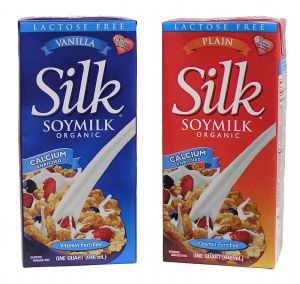On average, college students nation wide are not receiving enough vitamin D through their diet. As you may know, vitamin D is essential to form and maintain strong bones. Unfortunately, food groups that have high vitamin D content, such as milk, are very appealing to college students.  A study performed by “Nutrition Research”, examined 52 college students from West Chester University in Pennsylvania and their vitamin D and calcium intake. It was thought by researchers that soymilk that has been fortified with these two vitamins may increase their intake because of its greater availability and acceptability.
A study performed by “Nutrition Research”, examined 52 college students from West Chester University in Pennsylvania and their vitamin D and calcium intake. It was thought by researchers that soymilk that has been fortified with these two vitamins may increase their intake because of its greater availability and acceptability.
Participants of the study completed a 20 question survey regarding dietary and lifestyle factors that affect bone development and maintenance. The students were also required to keep a 3-day dietary record for 2 “typical” weekdays and 1 weekend day. They were then given an opportunity to taste-test three different flavors of soymilk (chocolate, vanilla, and plain). From the study, it was seen that 71% of the students do not meet the Adequate Intake (AI) of calcium or vitamin D. However, 65% said they would like to see soymilk become available in the dining halls. It was then determined that the majority of women do not meet the AI level for vitamin D because of caloric restrictions and the taste of milk.
Personally, I cannot relate to this study at all because ever since I was a baby, I have loved milk. In fact, I would wake up countless times during the night and cry until my parents would refill my bottle. However, I have many friends who do not drink milk but will drink soymilk.  One reason I think soymilk is a great alternative to drinking cow’s milk is because as stated in the study, soymilk contains phytoestrogens which play a role in maintaining bone mineral. It also contains isoflavones which haven been shown to be more effective than milk protein in maintaining bone mass in postmenopausal women. Fortunately for students at UNH, we have the option of drinking soymilk and attaining these essential vitamins through the diet. Without calcium and vitamin D, we put ourselves at risk for developing osteoporosis and other health-related problems down the road. So in all seriousness, DRINK UP!
One reason I think soymilk is a great alternative to drinking cow’s milk is because as stated in the study, soymilk contains phytoestrogens which play a role in maintaining bone mineral. It also contains isoflavones which haven been shown to be more effective than milk protein in maintaining bone mass in postmenopausal women. Fortunately for students at UNH, we have the option of drinking soymilk and attaining these essential vitamins through the diet. Without calcium and vitamin D, we put ourselves at risk for developing osteoporosis and other health-related problems down the road. So in all seriousness, DRINK UP!
